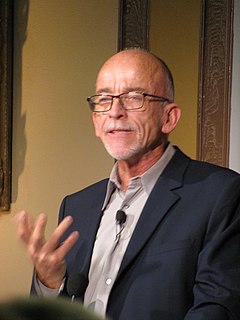A Quote by Mark Doty
It's unsettling, to lose the safety of the familiar, even when what's disrupted is an ordinary routine. When I began this poem, I was grieving for the loss of my old barbershop in Manhattan, and wondering at the strangeness of my new one. I didn't have any idea the poem would break into the underworld, opening a deeper subject: the continuing force of the old griefs routine helps to mediate, and my strange, sheer wonder at my own survival. Where's home now? In the contingent present, in which anything can disappear, and where we're sometimes granted some form of grace.
Quote Topics
Any
Anything
Barbershop
Began
Break
Contingent
Continuing
Deeper
Disappear
Even
Familiar
Force
Form
G Force
Grace
Granted
Grieving
Helps
Home
Idea
Lose
Loss
Manhattan
My Own
New
New One
Now
Old
Opening
Ordinary
Own
Poem
Present
Routine
Safety
Sheer
Some
Sometimes
Strange
Strangeness
Subject
Survival
Underworld
Unsettling
Which
Wonder
Wondering
Would
Related Quotes
The subject of the poem usually dictates the rhythm or the rhyme and its form. Sometimes, when you finish the poem and you think the poem is finished, the poem says, "You're not finished with me yet," and you have to go back and revise, and you may have another poem altogether. It has its own life to live.
Poetry is perhaps the oldest art form. We can go back to an age-old idea of naming things, the Adamic impulse - to give something a name has always been an immensely powerful thing. To name something is to own it, to capture it. A poem is still a kind of spell, an incantation. Historically, a poem also invoked: it was a blessing, or a curse, or a charm. It had a motile power, was able to summon something into being. A poem is a special kind of speech-act. In a good poem there's the trance-like effect of language in its most concentrated, naked form.
I keep feeling that there isn't one poem being written by any one of us - or a book or anything like that. The whole life of us writers, the whole product I guess I mean, is the one long poem - a community effort if you will. It's all the same poem. It doesn't belong to any one writer - it's God's poem perhaps. Or God's people's poem.
I think that poetry is an act of celebration, that anytime you're writing a poem, it means that you're celebrating something, even if it's a sad poem, if it's an angry poem, a political poem or anything at all. The fact that you're taking the time and energy to pick up this thing and hold it to the light, and say, "Let's take some time to consider this," means that you've deemed it worthy enough to spend time on - which, in my opinion, is celebrating.
I just remember their kindness and goodness to me, and their peacefulness and their utter simplicity. They inspired real reverence, and I think, in a way, they were certainly saints. And they were saints in that most effective and telling way: sanctified by leading ordinary lives in a completely supernatural manner, sanctified by obscurity, by usual skills, by common tasks, by routine, but skills, tasks, routine which received a supernatural form from grace within.
I was walking every morning, and I'd take my iPod and paper and pen.?As I walked, I wrote a poem, and then I'd come home - and sometimes it's legible, sometimes not - I typed the poem up. So I have a new, yet to be published, collection of poems now. It's called Walker's Alphabet, and among other things, it is about walking. My most recent collection of poems in 2010, incidentally, was titled WALKING backwards.


































